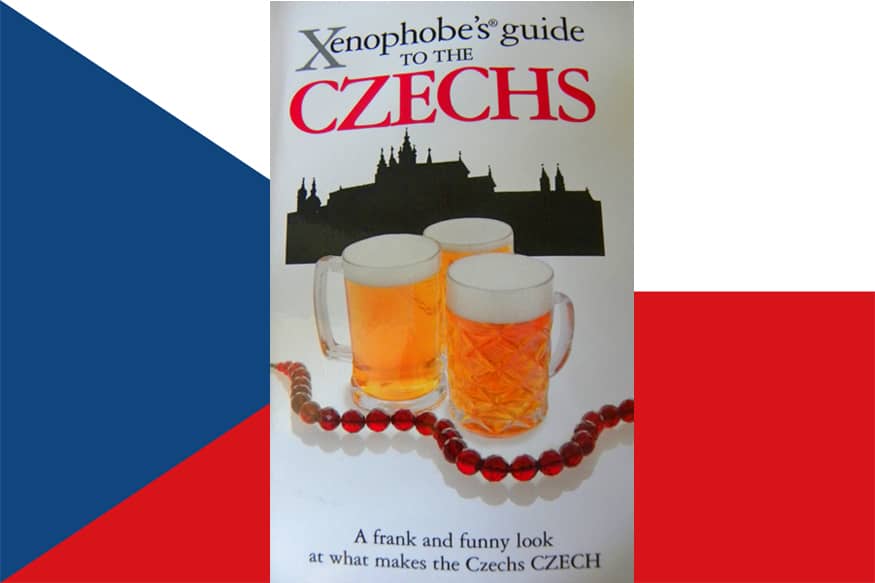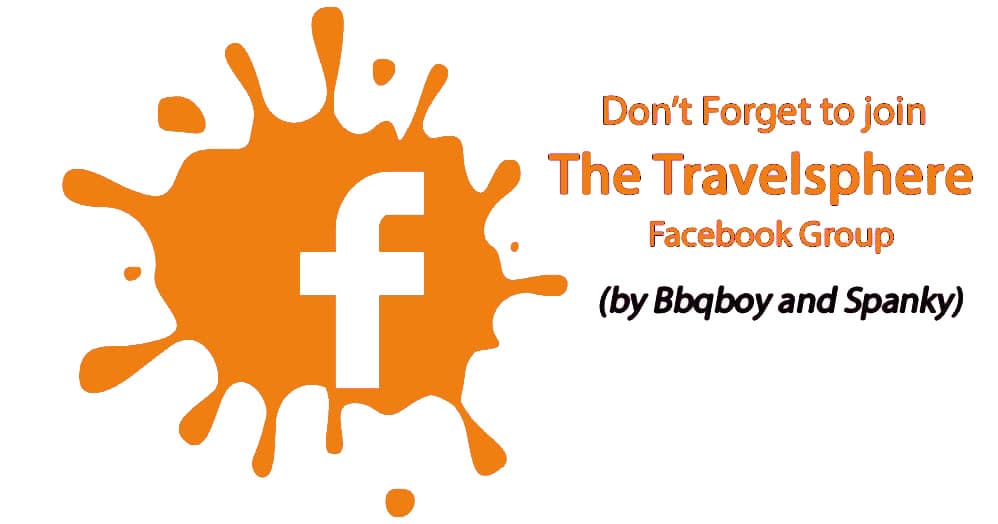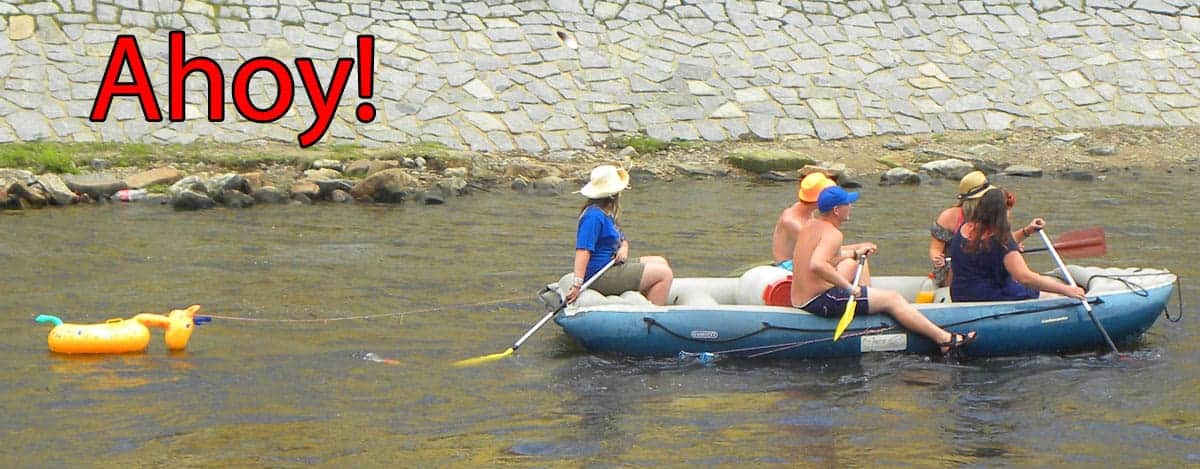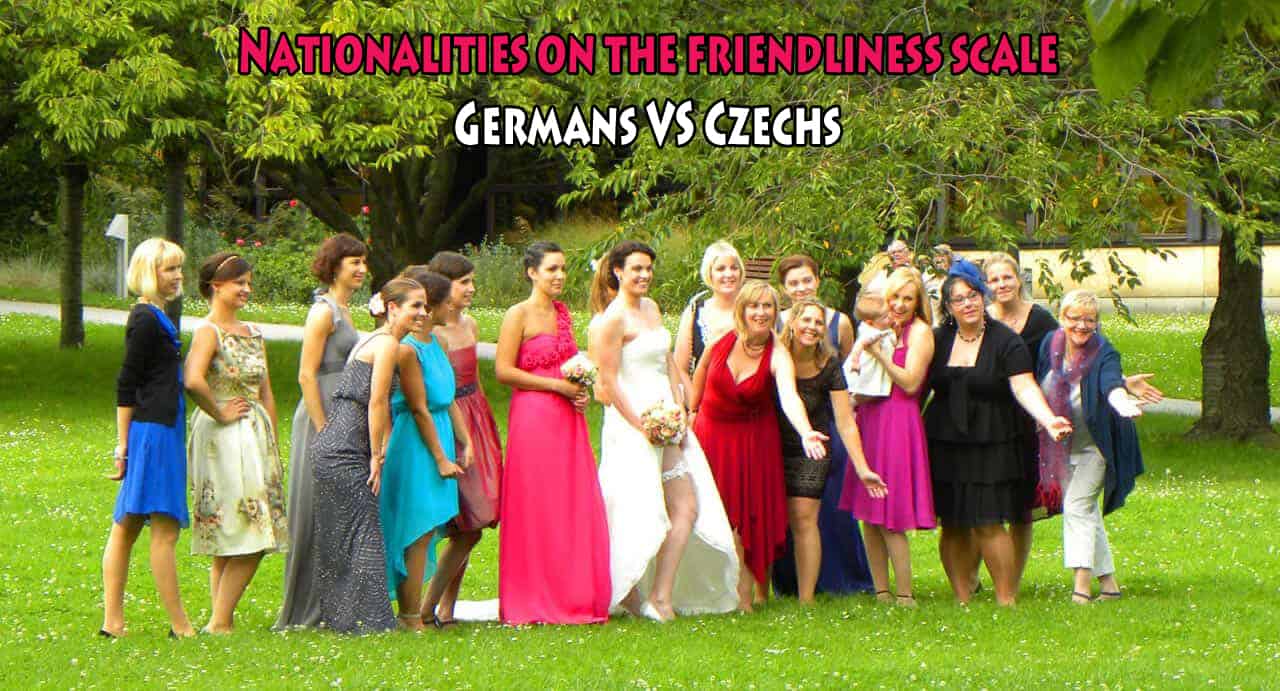I always want to know what makes people tick and understand how cultures differ from each other. I know humankind is basically the same, but I always wonder at how it is that, for example, the average Canadian is different from the average Czech in the way he/she behaves or looks at the world. And why. I find that stuff fascinating. So I was really happy to find this book. “Xenophobe’s guide to the Czechs” is written by three Czech authors and covers everything you want to know about what makes the Czechs tick. It’s honest and funny, but at the same time illuminating; both Lissette and I started reading and had some ‘Ah-ha” moments where our experiences matched some of those described in the book. Reading it, you may not come away with a great impression of the Czech people. But the book exemplifies one of the better traits of the Czechs; their self-deprecation and ability to laugh at themselves. They don’t take themselves too seriously.
I’ve extracted a few parts of this book for this post, things of particular interest to someone visiting the Czech Republic. Along the way I also add a few notes recounting some of our own experiences in the country.
Behaviour – “A state of fed-upness.”
“The first thing a foreigner will notice on arrival at the airport, train or coach station is how fed-up the Czechs look. The surly Customs officer frowns at you and you suspect that he probably knows about the contraband chewing-gum in your suitcase. The receptionist in the hotel glowers at you and you get the impression that she had her own plans for your booked room that evening. The sales assistant in the shop looks so doleful that you want to ask her if her much-beloved cat has died. It has not. She just looks like that. While members of other ethnicities tend to have a serious reason for being sullen, the Czechs need none.
If you don’t want to upset them, don’t try to cheer them up. Should you be travelling on public transport, and are feeling on top of the world, you had better hide your smiling face and sparkling look beneath a scarf or a hat. Or stare at the ground, or even try to imagine that you aren’t on your way to a wonderful concert followed by a splendid supper, but to your dentist for unpleasant treatment which you have been putting off for half a year.
Besides their gloomy mien, Czech fed-upness is expressed by endless complaints…Despite the fact that, in comparison with the rest of the European Union, the Czech Republic has the least number of people threatened by poverty, the inhabitants are prepetually fed-up; it’s not sufficient that nobody is really poor, they themselves are not rich enough. Don’t be afraid though, for they are quite harmless. Fed-upness is just a typical facial expression and is not usually accompanied by aggressive behaviour. The Czechs enjoy being teed-off. It is their most affordable hobby.”
Me: We laughed reading this because it is all so true. Our first encounter with the customs officer when arriving was just as described. I don’t think he even look up the whole time while checking our passports. He scanned them with a grim look on his face and handed them back while looking the other way. Interaction with locals on the street or in the market were more colourful. A woman gave me the nastiest look when I inadvertently blocked her way on the sidewalk while referring to my map. At the food market, an older lady was blocking part of the vegetable section with her food cart – I had to reach over her cart to get a red pepper on the other side. She just stared at me with such hate that you would have thought that I had just punched her in her face. We’ve noticed that older people here are a pretty miserable lot (although they have reasons to be. The book covers that as well).
Self-Identity – “How they see themselves”
“A Czech sees himself as…a good-hearted, easy-going figure from a novel by humorist and satirist Jaroslav Hašek. Rutund, talkative (garrulous even), indulging in beer and pickeled sausages (a local Czech delicacy nicknamed ‘utopence’), this hero is the good old soldier Švejk.
Švejk, though a soldier, is essentially anti-militarist. All the same, he is drafted into the First World War and there proves to be so idiotic and incompetent as to become a totally useless cog in the war machine. Although he is absolved from military service on an evaluation of his IQ, totally stupid he is not…being an inconspicuous Czech fellow, with a ready smile and silver tongue, he slips with almost proverbial luck from any scrimmage.
Švejk is a permanent outsider, but he knows how to live life to the fullest. He cannot be sad for long. While other national opuses trumpet the idea of love (truth, honor, etc) being stronger than death, Švejk claims that virtue also lies in a jolly mind, endless tall tales, a certain degree of shallowness and limitless determination not to get involved in any situation…for his ability to sail through life the term ‘švejking’ has been coined.
The Czechs suffer from the classic inferiority complex of a small nation….In history the Czechs were always the innocent invaded ones – here from the west, there from the east – while all they ever wanted to do was to invent, write poetry and just be themselves. The invaders stole the drawings and plans and exploited them by passing them off as their own. Thus, very few inventions managed to get smuggled all the way to the patent office by Czechs. The Ververka cousins actually managed to do so. They invented something called the ‘ruchadlo’ – an obscure improvement to the common plough – about which the world was supposed to sit up in awe. Their story is part of the nation’s primary school curriculum and every small child knows it by heart. The nation is extremely proud of its ruchadlo. The fact that nobody really knows exactly what a ruchadlo is, and what it’s good for, does not change anything one iota.
Me: “Easy-going”, “with a ready smile” – funny the differences between how people see themselves and how they come off. We don’t see Czechs as being particularly smiley. But I’ve written this somewhere else: North Americans tend to walk around smiling at everyone, greeting people like long lost relatives. Europeans don’t put on that show. Czechs we’ve met might not be outwardly friendly but they’ve been helpful and efficient when we’ve needed help or gone somewhere to get something done. And after a while we actually started getting a few “Dobrý dens” (hellos) and the semblance of a smile when entering our apartment building in Prague. Where you do see warmth is when they are with their dogs and children. You can see they love each (especially their dogs, a.k.a the favorite member of the family). Seeing them interact with their dogs and children is one of the things we appreciated from our time living in our little suburban neighbourhood.
“How others see them”
“The Czechs know only too well how others see them because hardly a week goes by without the results of yet another research project among tourists being published. Obsessions with one’s own image is typical not only of adolescent teenagers, but of young nations too.
For the Germans, the Czechs have always been part of their expansion towards the east. The Charles University is considered by many Germans to be the oldest German university… According to the Germans, Czechs were the labourers in the Czech Kingdom and Germans the lords.
The Germans believe the Czechs are very skilled, but in need of management. With good (in other words German) management the country will flourish. In Germany the expression ‘a Czech village’ means a dirty, disorganized place. The Germans think this is how the Czechs would end up without them.
A lot of Russians come to Prague and to the spa town Karlovy Vary. They find Czechs narrow-minded…
The Austrians feel they have a special relationship with the Czechs. For more than three centuries the Czech Kingdom was part of the Habsburg Empire with its capital in Vienna…But deep down, Austrians and Czechs cannot stand each other; they consider one another’s nation to be the worst in the world. Never admit to either of them that you think they are similar as they would be deeply insulted. When they look at one another, it is like looking into a mirror and seeing all their own faults.”
“How they would like to be seen”
“They would like to be seen as a modern, rapidly developing country full of promise, opportunities and educated people; as being not only the link between the West and the East, but also a cauldron in which all that’s good from the West and the East melts; as, if not the best, then at least one of the top nations in the world.
Czechs believe they have the best cuisine and the best beer in the galaxy (Bohemian dumplings and Pilsen Urquell being the super-stars) the prettiest girls (Dolly Buster, Ivana Trump, Eva Herzigova to mention just a few), the best sportsment since the stone age ( Zátopek, Navrátilová, Lendl, Jágr, Nedvěd) and one of the world’s great actors, Herbert Lom (Inspector Clouseau’s put-upon Chief of Police).
To this can be added a belief of the Czechs that they are a sophisticated nation with the oldest (1348) educational institute in the world…the finest artists, philosophers, writers, poets and thinkers – Havel, Kafka, Kundera, Forman, Čapek, Hašek, Seifert, Comelius….businessmen and inventors – Skoba, Baťa [Bata Shoes], Wichterle (the father of soft contact lenses)….musicians and composers – Dvořák, Smetana, Janáček.
All in all, the Czechs want the rest of the world to be like them. This is also the official result of a poll conducted by a leading national broadsheet. The question put to the public was; “If you had to choose another country to live in, where would it be?” To everyone’s surprise the answer was not Tahiti, Paris, Dubai, the Seychelles or Florida, but Slovakia. Why? Because, as a former part of the country, it is the closest everyone can get to their most admired, desired and loved people in the universe – the Czechs.”
“How they feel about their neighbors”
“The Czechs were twice occupied in the 20th century, the first time by the Germans (1938-1945) and the second time by the Soviets (1968-1990).
To be a German is not a crime anymore in the Czech Republic. However he must reckon with being viewed, regardless of his true character, as an unsympathetic, coarse and bigheaded creature, devoid of even the most elementary sense of humour. All traditional German virtues – a sense of comradeship, orderliness, dutifulness, obedience and so forth – are to Czechs almost a complete list of human depravities.
Czechs have a complex about the Germans because they seem more successful at almost everything, and more and more German companies are appearing in their midst. Many people worry that their country will be sold out to the Germans…
The Czechs are only able to beat the Germans at three things; 1) beer drinking, 2) ice hockey 3) being on the right side during world wars.
Surprisingly, Germans are not the victims of Czech jokes all that often. When Czechs are poking fun at someone, it’s usually the super-powers such as the Americans, the Russians or the Martians….
Czechs don’t find German women attractive; they feel that it’s “Better to have a warm Czech beer than a cold German woman”.
On the southern Czech border lies Austria whose inhabitants have the indisputable bad luck to be German-speaking too…But Austrians did not endear themselves to many Czechs when, after the lifting of the Iron Curtain, they posted notices in their shops that said: ‘Czechs – don’t steal!’. One half of the nation felt insulted by the implied accusation, while the other half mused over how the Austrians could have found out.
Historically, the Poles were always viewed as horse-traders, pedlars and thieves, the Hungarians as primitive vegetable farmers and probably thieves, the Romanians, Bulgarians and Yugoslavs as child snatchers, smugglers and definitely thieves. The Russians and Ukrainians were unmentionables. This distorted image sticks and has a lot to do with the still bitter memory of some of these countries having taken part in the 1968 Soviet-led invasion that put a brutal end to the so-called ‘Prague Spring’, the Czechs’ noble and naïve attempt at reforms.
The most amicably accepted nationals are the Slovaks. The Czechs have even pardoned them for disaffiliating themselves from the Czechs after decades of co-existence. With the patronising attitude of an older brother, the Czechs tell the Slovaks – whos economy is much more progressive than that of Czechia [“the Czech lands”] – how to do things and are offended when the Slovaks do things differently. But they always forgive them, Czechs and Slovaks really do seem like brothers. Their languages are so similar that they easily understand each other. To Czechs, who don’t really master any foreign language, this gives the elated feeling of true worldliness.”
Me: One particularity I was told by an English teacher in Prague; her students have no interest in the USA. She mentioned however that they are fascinated by Canada and that visiting the country is every Czechs’ dream. I found that interesting. Why? Does it have something to do with the shared hockey culture?
Beer
“When you want to start a conversation with a Czech and you are not sure what to talk about, then talking about beer is an ideal opener. Just remember that you can criticise almost everything, but not Czech beer. If you wish to discredit yourself foreever in society, just remark that quite good beer is also to be found, for example, in Belgium.
…a former prime minister on an official visit to a neighboring state publicly proclaimed its beer to be only good ‘for cleasing dentures’.
Czechia has the highest consumption of beer per person in the world…to say about someone that he drinks like a fish is not a reproach, but a compliment.
In the heart of its consumers Czech beer stands only one comparison; that of Irish beer. But you have to add that Irish beer have an entirely different character, sugar content and who knows what else…”
.
I don’t want to give the rest of the book away. But it is a fascinating read on everything Czech; their national obsessions, sense of humour, attitudes and values, behaviour, language, customs & traditions, and a lot more. “Xenophobe’s Guides” cover many countries – I’m now curious (and almost afraid) to know what they say about us Canadians. Anyway, I recommend the Czech edition and would suggest it to anyone planning to spend any amount of time in the Czech Republic*.
* We’ve received no compensation of any kind for recommending this book.
Related: ‘Ahoy!!’ Why you would be mistaken to think that the Czech Republic is a great seafaring nation.
Related: Nationalities on the friendliness scale. Case study: Germans and Czechs
Related: Travel Guide – The Best of the Czech Republic
Ps. If you find our blog helpful, please consider using our links to book your flights, hotels, tours, and car rentals. Have a look at our Travel Resources page.






Hi Frank & Lissette,
I really need to read that book. I enjoyed reading this article so much. Some of my czech opinions about it:
I have to agree with most of it. The only thing I don’t agree so much is the part about Veverka cousins. I know perfectly how ruchadlo works, actually those cousins were my relatives so I had to know it as a child better than all my classmates. But when I ask about them any czech person, they don’t know who they were. Only school children know it. I think that we are more proud about Wichterle (contact lenses) or Kundera. BTW Wichterle created his lenses on a machine made of toy construction kit called Merkur (http://www.merkurtoys.cz/en/). People of my generation love that toy.
And I hate Švejk. That’s the only book I wasn’t able to read at all and I wasn’t even able to watch the film. Once at high-school I said that it was like the worst book about czechs at all and then I was attacked by one of my classmates 😀 I think that for example Bohumil Hrabal described our characters better. But everyone has different opinion 🙂
I feel bad that I’m the only czech who admit that we are just the same as Austrians 😀 I’m actually pretty sure about it 🙂 Czechs are not Slavs for sure, we are third german nation after germans and austrians 😀 but don’t tell that to anyone otherwise they would kill me 😀
And what’s worst? I don’t like beer 😀 😀 😀 hmmm am I really czech?
Looking forward your next posts 🙂
Anna
Thank you for the great comment Anna. I think I’ve seen that toy somewhere, or maybe it was a copy of some sort, but I remember when all those construction kits were popular. I personally played with Legos when I was a kid.
I think us Canadians would drink as much beer as Czechs if the prices were the same. I’ve calculated the average 500 ml can here about the equivalent of $0.60 Canadian. In Canada you’ll be lucky to get one for $2.50, you’ll most likely pay around $3.50 for a 500 ml can. All I’m saying is that us Canadians pretty good drinkers too and we’d most likely beat you in beer drinking (like we do in hockey) if it wasn’t for the economics of the cost of beer 😉 . I’m just kidding. I’ll admit Czech beer much better than Canadian beer.
Do you know anyone who can drink daily about a16-25 beers (500 ml)? It means about 8 – 13 liters of liquid usually in few hours? Nobody can beat us
Holy cow! That much? Ok, you win 🙂 .
I needed this laugh! Bohemia actually took part of Austria and ruled from it to Hungary to the Baltic for awhile. Czechoslovakia’s revolts actually influenced Ukranians to do the same. There was a big exchange period too. I have to research the German and Russian occupations. AUSTRIANS actually have a same outlook of Czechs get employed even if it’s as a lawyer and then the Pols do the hard labor. LOL. This was great.
I had such a laugh when reading this. So many things are true 🙂 🙂 🙂
Thank you Alexandra. Yes, coming from Slovakia I thought you’d enjoy this one…